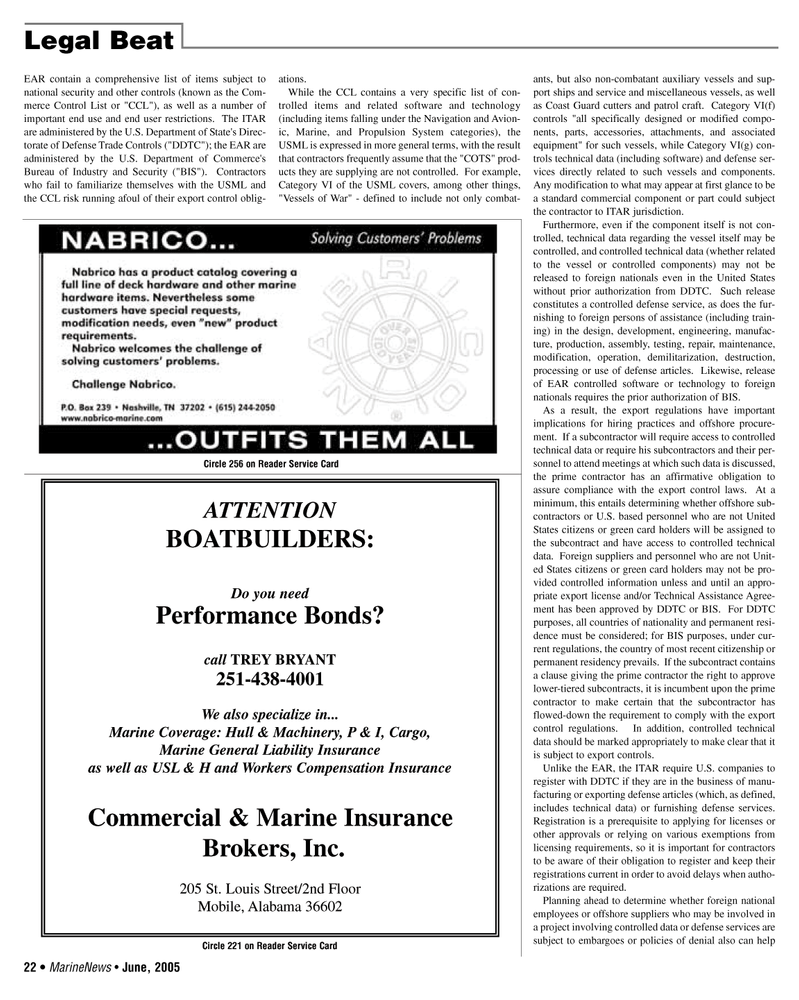
Page 22: of Marine News Magazine (June 2005)
Read this page in Pdf, Flash or Html5 edition of June 2005 Marine News Magazine
EAR contain a comprehensive list of items subject to national security and other controls (known as the Com- merce Control List or "CCL"), as well as a number of important end use and end user restrictions. The ITAR are administered by the U.S. Department of State's Direc- torate of Defense Trade Controls ("DDTC"); the EAR are administered by the U.S. Department of Commerce's
Bureau of Industry and Security ("BIS"). Contractors who fail to familiarize themselves with the USML and the CCL risk running afoul of their export control oblig- ations.
While the CCL contains a very specific list of con- trolled items and related software and technology (including items falling under the Navigation and Avion- ic, Marine, and Propulsion System categories), the
USML is expressed in more general terms, with the result that contractors frequently assume that the "COTS" prod- ucts they are supplying are not controlled. For example,
Category VI of the USML covers, among other things, "Vessels of War" - defined to include not only combat- ants, but also non-combatant auxiliary vessels and sup- port ships and service and miscellaneous vessels, as well as Coast Guard cutters and patrol craft. Category VI(f) controls "all specifically designed or modified compo- nents, parts, accessories, attachments, and associated equipment" for such vessels, while Category VI(g) con- trols technical data (including software) and defense ser- vices directly related to such vessels and components.
Any modification to what may appear at first glance to be a standard commercial component or part could subject the contractor to ITAR jurisdiction.
Furthermore, even if the component itself is not con- trolled, technical data regarding the vessel itself may be controlled, and controlled technical data (whether related to the vessel or controlled components) may not be released to foreign nationals even in the United States without prior authorization from DDTC. Such release constitutes a controlled defense service, as does the fur- nishing to foreign persons of assistance (including train- ing) in the design, development, engineering, manufac- ture, production, assembly, testing, repair, maintenance, modification, operation, demilitarization, destruction, processing or use of defense articles. Likewise, release of EAR controlled software or technology to foreign nationals requires the prior authorization of BIS.
As a result, the export regulations have important implications for hiring practices and offshore procure- ment. If a subcontractor will require access to controlled technical data or require his subcontractors and their per- sonnel to attend meetings at which such data is discussed, the prime contractor has an affirmative obligation to assure compliance with the export control laws. At a minimum, this entails determining whether offshore sub- contractors or U.S. based personnel who are not United
States citizens or green card holders will be assigned to the subcontract and have access to controlled technical data. Foreign suppliers and personnel who are not Unit- ed States citizens or green card holders may not be pro- vided controlled information unless and until an appro- priate export license and/or Technical Assistance Agree- ment has been approved by DDTC or BIS. For DDTC purposes, all countries of nationality and permanent resi- dence must be considered; for BIS purposes, under cur- rent regulations, the country of most recent citizenship or permanent residency prevails. If the subcontract contains a clause giving the prime contractor the right to approve lower-tiered subcontracts, it is incumbent upon the prime contractor to make certain that the subcontractor has flowed-down the requirement to comply with the export control regulations. In addition, controlled technical data should be marked appropriately to make clear that it is subject to export controls.
Unlike the EAR, the ITAR require U.S. companies to register with DDTC if they are in the business of manu- facturing or exporting defense articles (which, as defined, includes technical data) or furnishing defense services.
Registration is a prerequisite to applying for licenses or other approvals or relying on various exemptions from licensing requirements, so it is important for contractors to be aware of their obligation to register and keep their registrations current in order to avoid delays when autho- rizations are required.
Planning ahead to determine whether foreign national employees or offshore suppliers who may be involved in a project involving controlled data or defense services are subject to embargoes or policies of denial also can help 22 • MarineNews • June, 2005
ATTENTION
BOATBUILDERS:
Do you need
Performance Bonds? call TREY BRYANT 251-438-4001
We also specialize in...
Marine Coverage: Hull & Machinery, P & I, Cargo,
Marine General Liability Insurance as well as USL & H and Workers Compensation Insurance
Commercial & Marine Insurance
Brokers, Inc. 205 St. Louis Street/2nd Floor
Mobile, Alabama 36602
Circle 221 on Reader Service Card
Circle 256 on Reader Service Card
Legal Beat
JUNEMN2005 3(17-24)saved3.qxd 5/26/2005 12:16 PM Page 22

 21
21

 23
23
